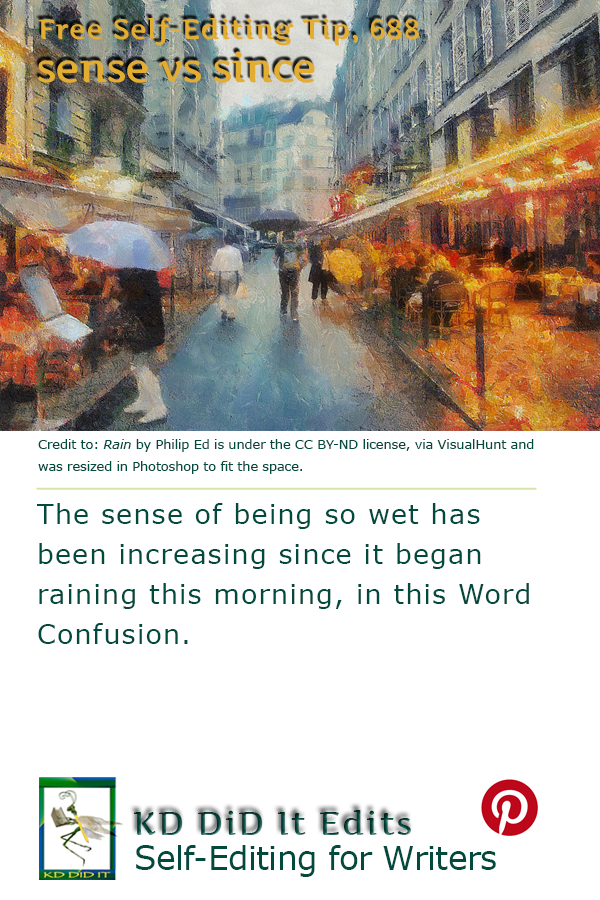Revised as of
1 Oct 2022
“I since a presence . . . a malevolent presence” makes me feel as though something is missing . . . In fact, I sense it strongly, lol.
*Still laughing*, you may also want to explore this compound word post “Common Sense versus Commonsense“, “Cent vs Scent vs Sense vs Sent“, and/or “Censer vs Censor vs Sensor“.
Word Confusions . . .
. . . started as my way of dealing with a professional frustration with properly spelled words that were out of context in manuscripts I was editing as well as books I was reviewing. It evolved into a sharing of information with y’all. I’m hoping you’ll share with us words that have been a bête noire for you from either end.
If you found this post on “Sense versus Since” interesting, consider tweeting it to your friends. Subscribe to KD Did It, if you’d like to track this post for future updates.
| Sense | Since |
|---|---|

Hot Briquettes by Geralt is under the Pixabay License, via Pixabay. — I sense . . . heat. |

Mid-city Leaner A by Infrogmation is under the CC BY 2.0 license, via VisualHunt. — Well, it has been while since anyone has lived there. |
| Part of Grammar: | |
| Noun; Verb, transitive
Plural for the noun: senses Third person present verb: senses |
Adverb; Conjunction; Preposition |
| Perception
Noun: A faculty by which the body perceives an external stimulus
These faculties all together A feeling that something is the case
A sane and realistic attitude to situations and problems
A more or less vague perception or impression A way in which an expression or a situation can be interpreted
[Chiefly Mathematics & Physics] A property, e.g., direction of motion distinguishing a pair of objects, quantities, effects, etc. which differ only in that each is the reverse of the other
A faculty or function of the mind analogous to sensation Any special capacity for perception, estimation, appreciation, etc. [Usually senses] Clear and sound mental faculties
A mental discernment, realization, or recognition; acuteness The recognition of something as incumbent or fitting Sound practical intelligence The value or worth of something
An opinion or judgment formed or held, especially by an assemblage or body of persons Verb, transitive:
[Mechanical devices] To detect physical phenomena, as light, temperature, radioactivity, etc., mechanically, electrically, or photoelectrically [Computers] To read (punched holes, tape, data, etc.) mechanically, electrically, or photoelectrically To grasp the meaning of
|
From that time
Adverb: [Often preceded by ever] From then till now Between a particular past time and the present
Ago
Conjunction: Continuously from or counting from the time when Because
Preposition: Between a past time or event and the present |
| Examples: | |
| Noun: The bear has a keen sense of smell that enables it to hunt at dusk. What do your senses tell you? Yes, doctor, all my senses are functional. She had the sense of being a political outsider. You can improve your general health and sense of well-being. She had a fine sense of comic timing. He gives me such a sense of security. He earned respect by the good sense he showed at meetings. I can’t see the sense in leaving all the work to you. It is not clear which sense of the word characters is intended in this passage. “The characteristics of a vector are the magnitude, the orientation, and the sense” (What). “Molecular biologists call a single strand of DNA sense (or positive (+)) if an RNA version of the same sequence is translated or translatable into protein” (Sense). In the midst of a blizzard, John turned to Mike and said, “I sense that it’s a mite cold.” From a moral sense, that is simply wrong. Rebecca has the greatest sense of humor. She has an acute sense of smell. Have you taken leave of your senses? Penny has a sense of the worth of a vintage piece of furniture. John has a strong sense of duty. He has no sense. Try to talk sense instead of shouting. You missed the sense of his statement. There’s no sense in worrying about the past. I may be wrong, but I sense this is an intervention. Verb, transitive: She could sense her father’s anger rising. He could sense that he wasn’t liked. An optical fiber senses a current flowing in a conductor. Luke senses a disturbance in the Force. I think I get the sense of it. Those automatic doors are so great in how they sense someone approaching them. Card punches detect mark sense cards and then punch the corresponding information into the card. |
Adverb: He was elected in 1978 and has been president ever since. She at first refused, but has since consented. It’s long since time to discuss this. Conjunction: He has been busy since he came. Since you’re already here, you might as well stay. Preposition: There have been many changes since the war. It’s been getting colder since you came. |
| Derivatives: | |
| Adjective: half-sensed, senseless, unsensed, unsensing Adverb: senselessly Noun: sense-experience, senselessness, sensor |
|
| History of the Word: | |
| Late Middle English (as a noun in the sense of meaning) is from the Latin sensus meaning faculty of feeling, thought, meaning, from sentire meaning feel.
The verb dates from the mid-16th century. |
Late Middle English as a contraction of the obsolete sithence, or from dialect sin. Both from are from dialect sithen meaning thereupon, afterward, ever since. |
C’mon, get it out of your system, bitch, whine, moan . . . which words are your pet peeves? Also, please note that I try to be as accurate as I can, but mistakes happen or I miss something. Email me if you find errors, so I can fix them . . . and we’ll all benefit!
Satisfy your curiosity about other Word Confusions on its homepage or more generally explore the index of self-editing posts. You may also want to explore Book Layout & Formatting Ideas, Formatting Tips, Grammar Explanations, Linguistics, Publishing Tips, the Properly Punctuated, Writing Ideas and Resources, and Working Your Website.
Resources for Sense versus Since
Apple Dictionary.com
“Sense (Molecular Biology).” Wikipedia. n.d. Web. n.d. Wiki <https://en.wikipedia.org/wiki/Sense_(molecular_biology)>.
“What is the Sense of a Vector.” Stack Exchange. Sept 2014. Web. n.d. <https://physics.stackexchange.com/questions/132189/what-is-the-sense-of-a-vector>.
Pinterest Photo Credits:
Rain, <https://visualhunt.com/re/828b21>, by Philip Ed, <https://visualhunt.com/author/5c4812>, is under the CC BY-ND license, via VisualHunt and was resized in Photoshop to fit the space.


